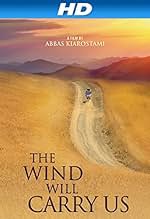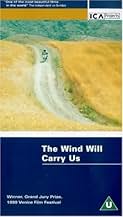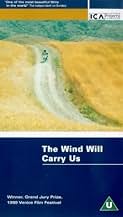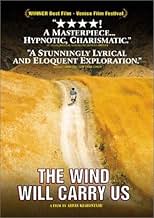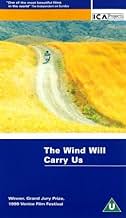CALIFICACIÓN DE IMDb
7.4/10
13 k
TU CALIFICACIÓN
El irreverente ingeniero municipal Behzad llega a un pueblo rural iraní para cuidar a un pariente moribundo. Sigue sus esfuerzos por adaptarse a la comunidad local.El irreverente ingeniero municipal Behzad llega a un pueblo rural iraní para cuidar a un pariente moribundo. Sigue sus esfuerzos por adaptarse a la comunidad local.El irreverente ingeniero municipal Behzad llega a un pueblo rural iraní para cuidar a un pariente moribundo. Sigue sus esfuerzos por adaptarse a la comunidad local.
- Dirección
- Guionistas
- Elenco
- Premios
- 4 premios ganados y 7 nominaciones en total
- Dirección
- Guionistas
- Todo el elenco y el equipo
- Producción, taquilla y más en IMDbPro
Opiniones destacadas
Typically enigmatic Kiarostami film (although one not without some deadpan comedy, and with all the inherent geographic and cultural fascination associated with his work for Western audiences) winds through his previous work and themes, and through the remote Iranian village in which it's set, as gracefully and surely as a river (a somewhat fearsome one, for all its calmness). It's about (apparently) a group of photographers or filmmakers - only one of whom is ever seen directly - awaiting a mysterious ceremony that will follow an ailing old woman's death (actually, I'm not entirely sure of the accuracy of even that broad a synopsis) but although the narrative may be in part a death watch, the film itself is "a subtle personal debate about the value of being alive" (a beautiful one-line summary by Deborah Young of Variety). The film strikes a mystical balance between its parched environment and the signs of the modern world: the process of getting the cell phone to work forms a recurring pattern, warily intertwining with fragments of old poems and evocations of antiquity, mystery and ritual. The ending was, to me, more satisfying than in his last film A Taste Of Cherry, but the film really requires a second viewing: after seeing it just once, you walk away slightly deflated - even indignant - at having largely failed its navigational challenge.
What a wonderful movie. Iranian movies are making way internationally and are also becoming an important political tool. The leading Iranian director is Abbas Kiarostami. I really enjoyed the rhythm of this strange and different movie. This is an art-film at its very best. All set in the wonderful scenery of Kurdistan. The pictures and the poetry is beautiful. The cast is natural, common people. Please buy the DVD and see it! The movie is - unfortunately - sure not to come to a theater near you. The director Abbas Kiarostami says that 50% of a movie is made by associations and in the audience own head. Very different from the American movies where everything usually is served on one plate.
'The Wind Will Carry Us' is above all a detective story in its purest form, about the desire to know. This act of enquiry is extended to both the recording gaze of the camera and that something else emanating in the film's figurative language, the prevalance of natural objects that are what they are - trees, bridges, turtles, the wind, the river etc. - but also something else, something beautifully expressed, but only partially glimpsed, in the quotations from scripture and poetry that run through the film, from that gorgeous description at the beginning of trees as being greener than God's dreams, to the closing image of the hurled bone carried by the rapid stream down goat-chomping banks.
Such an image may remind Western viewers of Kubrick or Renoir. This is the large 'problem' with the film; rather, the problem of any viewer confronting any artwork from an alien culture. I was thinking of not even going to 'Wind', in spite of Kiarostami's reputation as THE director of the 1990s, and the fact that I loved 'Close-Up'. Early reviews made it seem dispiritingly forbidding, and who wants to go to a film if you have to read a ten-page article in 'Cineaste' to understand it? This kind of 'praise' is ultimately detrimental to the films - do we really 'get' Mizoguchi, Ray or Paradjanov films in their entirety either?
I won't lie: it's frustrating watching a film full of obviously symbolic moments that I can't grasp because I am culturally ignorant: the last ten minutes especially are baffling in their move to the ritual or abstract. The risk is to transpose Iranian figuration to their Western meanings, and thus dilute them. But, the film, as Kiarostami's are reputed to, unearth the universal through concentration on the culturally specific (although I've always found 'universality' a dubious aim).
Like I say, the film is a detective story, and if we can't solve the figurative, or metaphysical clues (although most of the poems are clear and lovely and resonant), there are other mysteries, both for the viewer and the main character. Who are these disembodied voices we hear but cannot see guiding us through a landscape at once natural, historical, poetic, social and religiously symbolic? Why have they come to this particular village? Why does the hero keep asking about this particular woman, and why does another woman keep ringing him on his borrowed mobile? Who are his shadowy companions?
Our bewilderment is shared by the 'modern' protagonist, who has to negotiate this seemingly medieval landscape with the aid of a guide (there are many fairy tale motifs throughout, from the forking roads and car breaking down, to the man getting trapped in a hole of his own making, reminding us that Iran was one of the fertile stages for the 'Arabian Nights').
This film may mean most to Iranians and pseuds, but will surely be resonant to anyone who's read Beckett, or been simply burdened with humanity - the constant waiting for something inexplicable to happen; the unseen, insistent powers that determine everything; the gallows humour of the only clear signal for a mobile phone being in a cemetary. The amazing thing about Kiarostami's famed (almost Borgesian) formalism and his metaphors is the way they arise so naturally from the realistic environment he's portraying, almost so you'd miss them - you have to look hard for the traces, the lines, the paralells, the repetitions, the angles, the reflections, the complex use of point of view that often seems literally god-like, and is of ambiguous attribution. Above all, it is a funny, engrossing, unsentimental look at people we rarely see on screen.
Such an image may remind Western viewers of Kubrick or Renoir. This is the large 'problem' with the film; rather, the problem of any viewer confronting any artwork from an alien culture. I was thinking of not even going to 'Wind', in spite of Kiarostami's reputation as THE director of the 1990s, and the fact that I loved 'Close-Up'. Early reviews made it seem dispiritingly forbidding, and who wants to go to a film if you have to read a ten-page article in 'Cineaste' to understand it? This kind of 'praise' is ultimately detrimental to the films - do we really 'get' Mizoguchi, Ray or Paradjanov films in their entirety either?
I won't lie: it's frustrating watching a film full of obviously symbolic moments that I can't grasp because I am culturally ignorant: the last ten minutes especially are baffling in their move to the ritual or abstract. The risk is to transpose Iranian figuration to their Western meanings, and thus dilute them. But, the film, as Kiarostami's are reputed to, unearth the universal through concentration on the culturally specific (although I've always found 'universality' a dubious aim).
Like I say, the film is a detective story, and if we can't solve the figurative, or metaphysical clues (although most of the poems are clear and lovely and resonant), there are other mysteries, both for the viewer and the main character. Who are these disembodied voices we hear but cannot see guiding us through a landscape at once natural, historical, poetic, social and religiously symbolic? Why have they come to this particular village? Why does the hero keep asking about this particular woman, and why does another woman keep ringing him on his borrowed mobile? Who are his shadowy companions?
Our bewilderment is shared by the 'modern' protagonist, who has to negotiate this seemingly medieval landscape with the aid of a guide (there are many fairy tale motifs throughout, from the forking roads and car breaking down, to the man getting trapped in a hole of his own making, reminding us that Iran was one of the fertile stages for the 'Arabian Nights').
This film may mean most to Iranians and pseuds, but will surely be resonant to anyone who's read Beckett, or been simply burdened with humanity - the constant waiting for something inexplicable to happen; the unseen, insistent powers that determine everything; the gallows humour of the only clear signal for a mobile phone being in a cemetary. The amazing thing about Kiarostami's famed (almost Borgesian) formalism and his metaphors is the way they arise so naturally from the realistic environment he's portraying, almost so you'd miss them - you have to look hard for the traces, the lines, the paralells, the repetitions, the angles, the reflections, the complex use of point of view that often seems literally god-like, and is of ambiguous attribution. Above all, it is a funny, engrossing, unsentimental look at people we rarely see on screen.
It is a very interesting and compelling film that on the surface seems to be one of the most boring ever made. "Wind Will Carry Us" tells the story of Behzad, the documentary director, who travels with his crew from Tehran to the tiny remote village of Siah Dareh where they hope to document an ancient funeral ritual. While there, all they can do is wait for an old lady to die and to hope that it would happen sooner than later. The lady does not seem to hurry to meet her Creator. Nothing much happens with the exception of waiting and repetitions of the same conversations on the cell phone with the constant interruption of calls but the honest and poetic celebration of the world around us shines through every frame of this ode to joy of life. One of my friends, who had recommended the movie to me, suggested that it should not be over- aestheticized and I totally agree. The film's serious political and social metaphors and overtones are undeniable but in its core, it is a moving, life-confirming, and soulful comedy. Watching my first Abbas Kiarastami's movie was a very rewarding experience.
An amazing Abbas Kiarostami movie. Inspired by the poem of Furug Ferruhzad, in this film, the director tells the universality experienced in daily life in the Iranian countryside without getting involved in the slightest arabesque element.
When the epic simplicity of the movie is watched with admiration, you will feel sorry for the millions of dollars spent on Hollywood movies of the new era.
When the epic simplicity of the movie is watched with admiration, you will feel sorry for the millions of dollars spent on Hollywood movies of the new era.
¿Sabías que…?
- TriviaThe title is a reference to a poem written by famous modern Iranian female poet Forough Farrokhzad.
- ErroresWhen the engineer is driving back from the mountain, he stops and picks up someone who is walking down the road and starts talking to him, but when the camera shows the car from long shot for the first time, there is no one in the car other than the engineer.
Selecciones populares
Inicia sesión para calificar y agrega a la lista de videos para obtener recomendaciones personalizadas
- How long is The Wind Will Carry Us?Con tecnología de Alexa
Detalles
- Fecha de lanzamiento
- País de origen
- Sitio oficial
- Idiomas
- También se conoce como
- The Wind Will Carry Us
- Locaciones de filmación
- Productora
- Ver más créditos de la compañía en IMDbPro
Taquilla
- Total en EE. UU. y Canadá
- USD 259,510
- Fin de semana de estreno en EE. UU. y Canadá
- USD 21,417
- 30 jul 2000
- Total a nivel mundial
- USD 259,510
Contribuir a esta página
Sugiere una edición o agrega el contenido que falta

